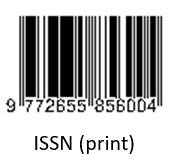An Enhanced Multi-Level Authentication Electronic Voting System
(1) Bowen University, Osun State, Nigeria
(2) Computer Science Dept., Bowen University, Iwo, Osun State, Nigeria
(3) Computer Science Dept., Bowen University, Iwo, Osun State, Nigeria
(*) Corresponding Author
Abstract
Full Text:
PDFReferences
Y. Xie, “Who Over reports Voting?”, J J.Am.Polit.Sci.Rev. 80, 613–624, 2017. [2] C. Ayo, O. Daramola, A. Azeta, “Developing A Secure Integrated E-Voting System”, In Handbook of Research on E-Services in the Public Sector: E-Government Strategies and Advancements, IGI Global, USA, 278–287, 2011.
S. Nakamoto, “Bitcoin: A Peer-to-Peer Electronic Cash System” Available: https://bitcoin.org/bitcoin.pdf, 2009.
M. Rockwell, “Bitcongress – Process for block voting and law”, Available: http://bitcongress.org/ [Accessed: December 2017].
A. Ndem, “Three risks posed by electronic voting - The Election Network”, Available: http://theelectionnetwork.com/2018/10/25/three-risks-posed-by-electronic-voting/, 2018.
O.O Adeosun. Ayodeji O.J. Ibitoye, J.O Alabi, “Real Time E-Biotechnology Voting System; Using Secret Splitting”, International Journal of Electronics Communication and Computer Engineering, 6(6), 2015.
A. Benny, “Blockchain based E-voting System”, SSRN Electronic Journal, 2020.
F. P. Hjalmarsson, G. K. Hreioarsson, M. Hamdaqa, G. Hjalmtysson, “Blockchain-Based E-Voting System”. IEEE International Conference on Cloud Computing, CLOUD, 2018-July, 983–986., 2018.
H. V. Patil, K. G. Rathi, M. V. Tribhuwan, Science, C., College, D. Y. P. A. C. S., “A Study on Decentralized E-Voting System Using Blockchain Technology”, International Research Journal of Engineering and Technology (IRJET), 5(11), 48–53, 2018.
K. Isirova, A. Kiian, M. Rodinko, A. Kuznetsov, “Decentralized electronic voting system based on blockchain technology developing principals”, CEUR Workshop Proceedings, 2608, 211–223, 2020.
K. K. Sharma, J. Raghatwan, M. Patole, V. M. Lomte, “Voting system using multichain blockchain and fingerprint verification”, International Journal of Innovative Technology and Exploring Engineering, 9(1), 3588–3597, 2019.
F., Fusco, M. I. Lunesu, F. E. Pani, A. Pinna, “Crypto-voting, a blockchain based e-voting system”, IC3K 2018 - Proceedings of the 10th International Joint Conference on Knowledge Discovery, Knowledge Engineering and Knowledge Management, 3, 223–227, 2018. [13] D. Thebus, O. Daramola, “E-voting System for National Elections Using a Blockchain Architecture”, In Pan African International Conference on Science, Computing and Telecommunications Book of Proceedings, University of Swaziland, Kwaluseni, Swaziland, 2019.
K. Sadia, M. Masuduzzaman, R. K. Paul, A. Islam, “Blockchain Based Secured E-voting by Using the Assistance of Smart Contract”, 2019.
R. Suganya, A. Sureshkumar, P. Alaguvathana, S. Priyadharshini, K. Jeevanantham, “Blockchain Based Secure Voting System Using IoT”, International Journal of Future Generation Communication and Networking, 13(3), 2134–2142. 2020.
C. C. Z. Wei and , C. C. Wen, “Blockchain-based electronic voting protocol”. International Journal on Informatics Visualization, 2(4–2), 336–341, 2018.
DOI: https://doi.org/10.24071/ijasst.v4i2.5237
Refbacks
- There are currently no refbacks.
Publisher : Faculty of Science and Technology
Society/Institution : Sanata Dharma University

This work is licensed under a Creative Commons Attribution 4.0 International License.












